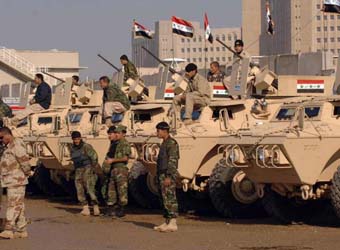The earth shook three times with the impact of air strikes targeting Islamic State positions north of Mosul. Only then did the Iraqi troops assembled on the edge of the small farming village advance.
The army had gathered on Friday afternoon in a muddy street that showed signs of heavy fighting with the jihadists from a day earlier: store fronts shorn off, electricity poles pulled down, bullet casings carpeting the ground. A rooftop sentinel kept watch.
The Iraqis’ tan-colored Humvees, reinforced with steel plates around the wheels to guard against sniper fire, were dwarfed by four MRAPs (mine-resistant ambush-protected vehicles) manned by U.S. military advisers.
The second phase of the operation to retake Mosul, Islamic State’s last major stronghold in Iraq, began on Thursday after several weeks of deadlock in the most complex operation in the country since the 2003 U.S.-led invasion.
Conventional U.S. forces deploying more extensively in this phase are now visible very close to the front lines. They are backing Iraq’s army, federal police and counter-terrorism service (CTS), whose levels of training and experience vary widely.
Since the offensive began 10 weeks ago, CTS punched into Mosul from the east and took a quarter of the city, but regular army troops like those in Sada have made slower progress advancing from the north and south, slowing the operation.
MARGINAL ADVANTAGE
Western officials from a coalition providing air support, training and advice to the Iraqi military have hailed the recovery of the army and police, which dropped their weapons and fled Islamic State’s blitz across a third of the country in 2014 despite billions of dollars in U.S. support.
“They don’t have to be as good as us, they just have to be better than Daesh,” one U.S. military official told Reuters earlier this year, using an Arabic acronym for Islamic State.
That marginal advantage, though, means the Mosul campaign is likely to drag on for many months and could wreak significant destruction.
During earlier battles like the one in Ramadi a year ago, coalition officials said they often had to prod the Iraqis to advance rather than wait for aerial bombardment to eliminate all enemy positions.
The Iraqi commanders in Sada huddled with the Americans for a few minutes on Friday, and after the third air strike piled into their vehicles. Half a dozen Humvees charged ahead, firing mounted machine guns and a rocket-propelled grenade.
As the sound of gunfire pierced the clear blue sky, the U.S. vehicles followed them down the road and appeared to establish overwatch positions in an adjacent field.
“The Americans came this morning. They are for guidance and direction only,” said one Iraqi soldier, a bandoleer hanging around his shoulders. “They don’t enter combat. They will turn and have our backs.”
Behind the Americans came a dozen more Iraqi Humvees, some of whose occupants fired wildly as they advanced. One soldier standing in the bed of a military truck lost balance and nearly tumbled out when the vehicle lurched forward.
Army officers said intelligence suggested about 30 Islamic State fighters were holed up inside the village with two car bombs and a truck bomb and were using tunnels between houses and into agricultural areas to furtively resupply or launch attacks.
Inside Sada, reporters saw the bodies of a dozen Islamic State fighters the army said were killed in earlier clashes. A soldier held up the severed head of one, an expression of shock still on its face.
Source: Reuters


